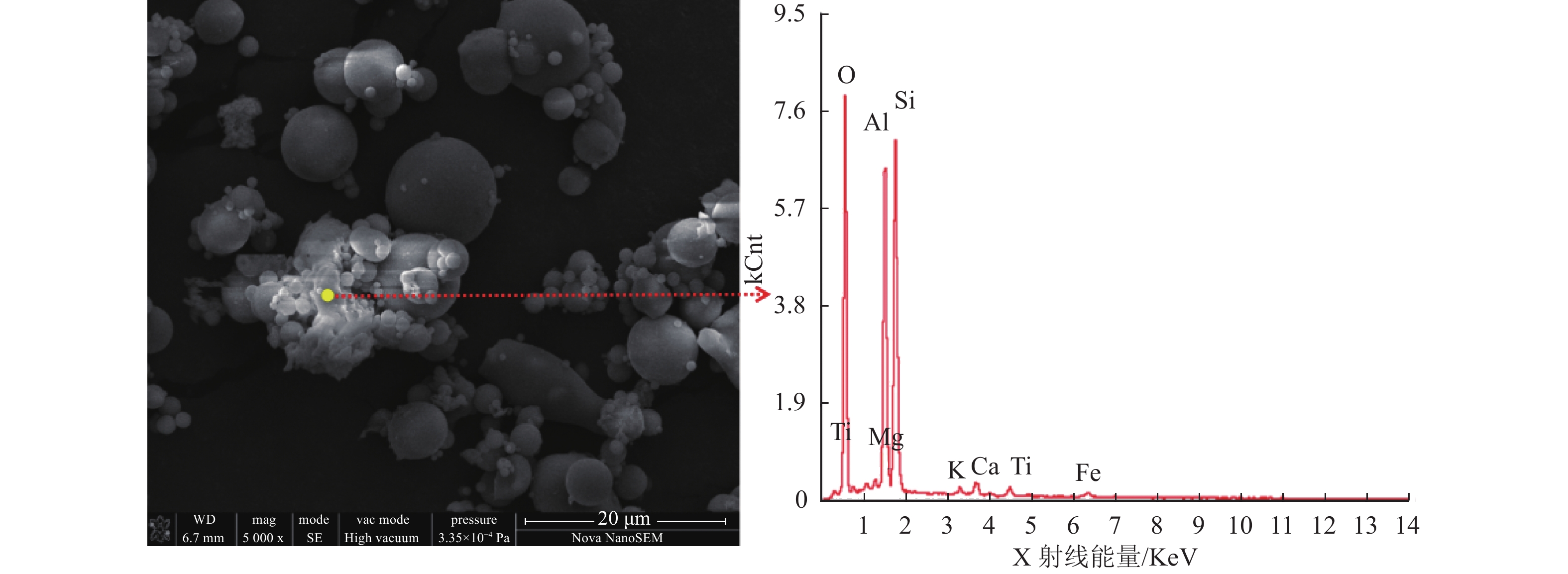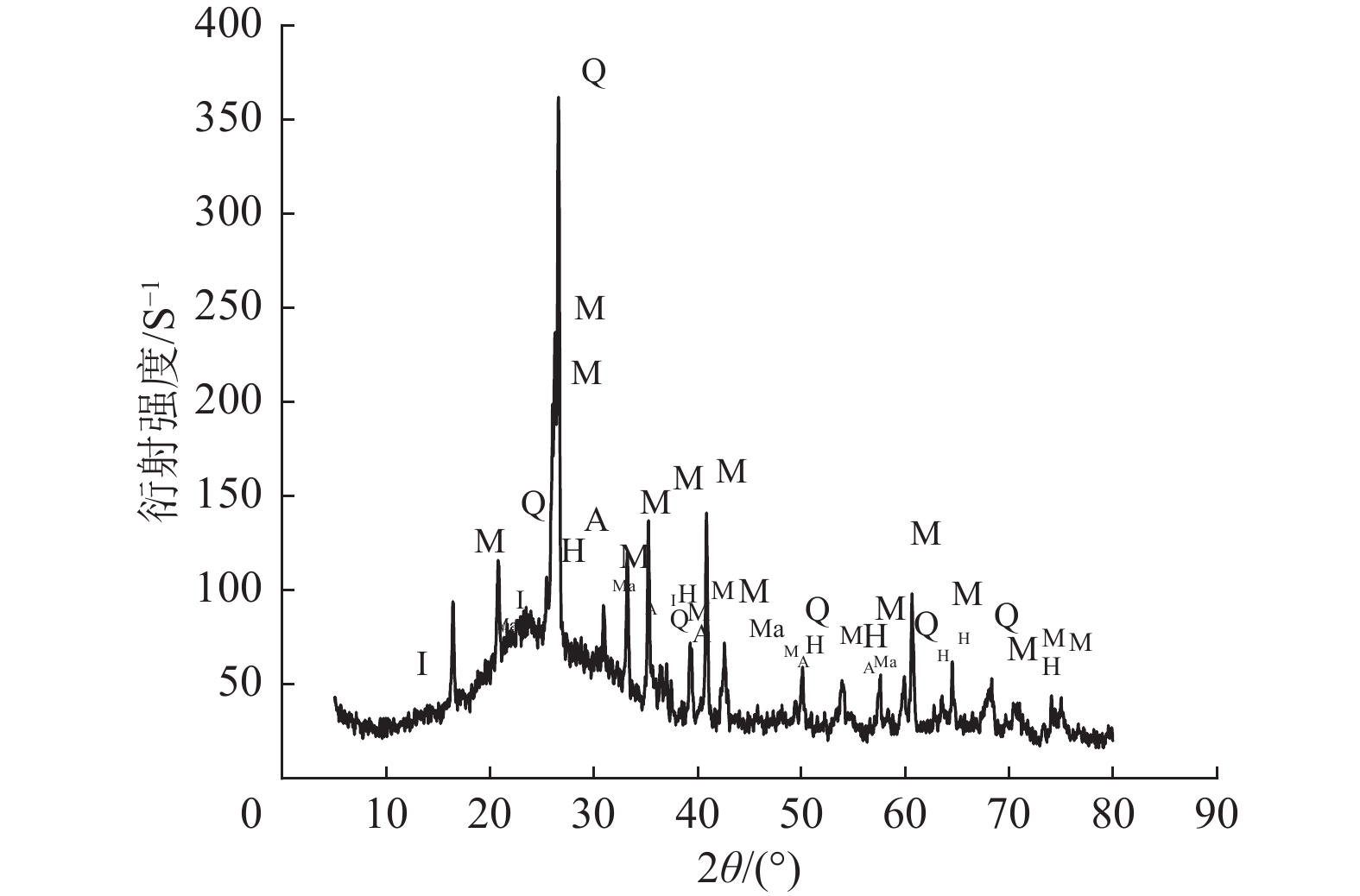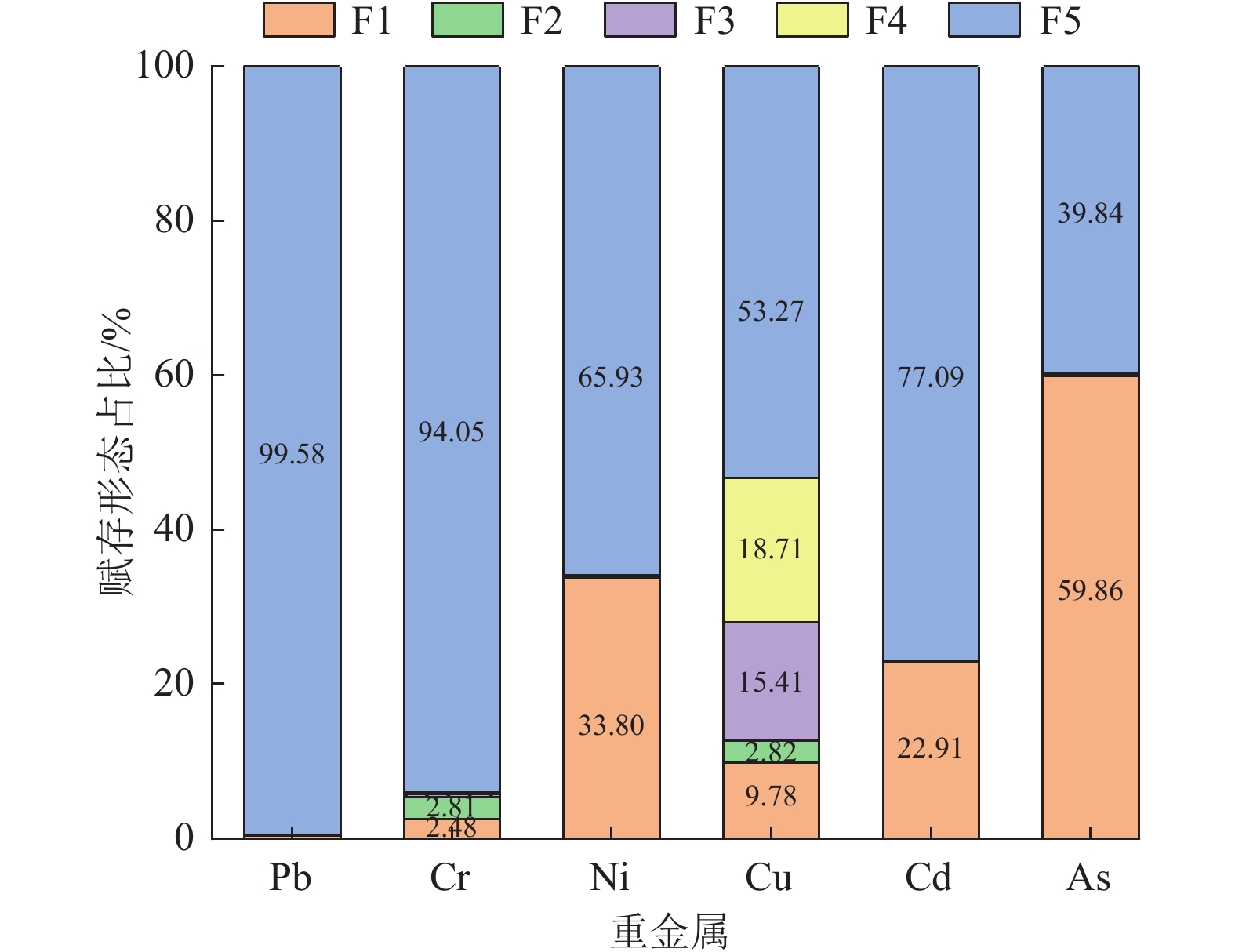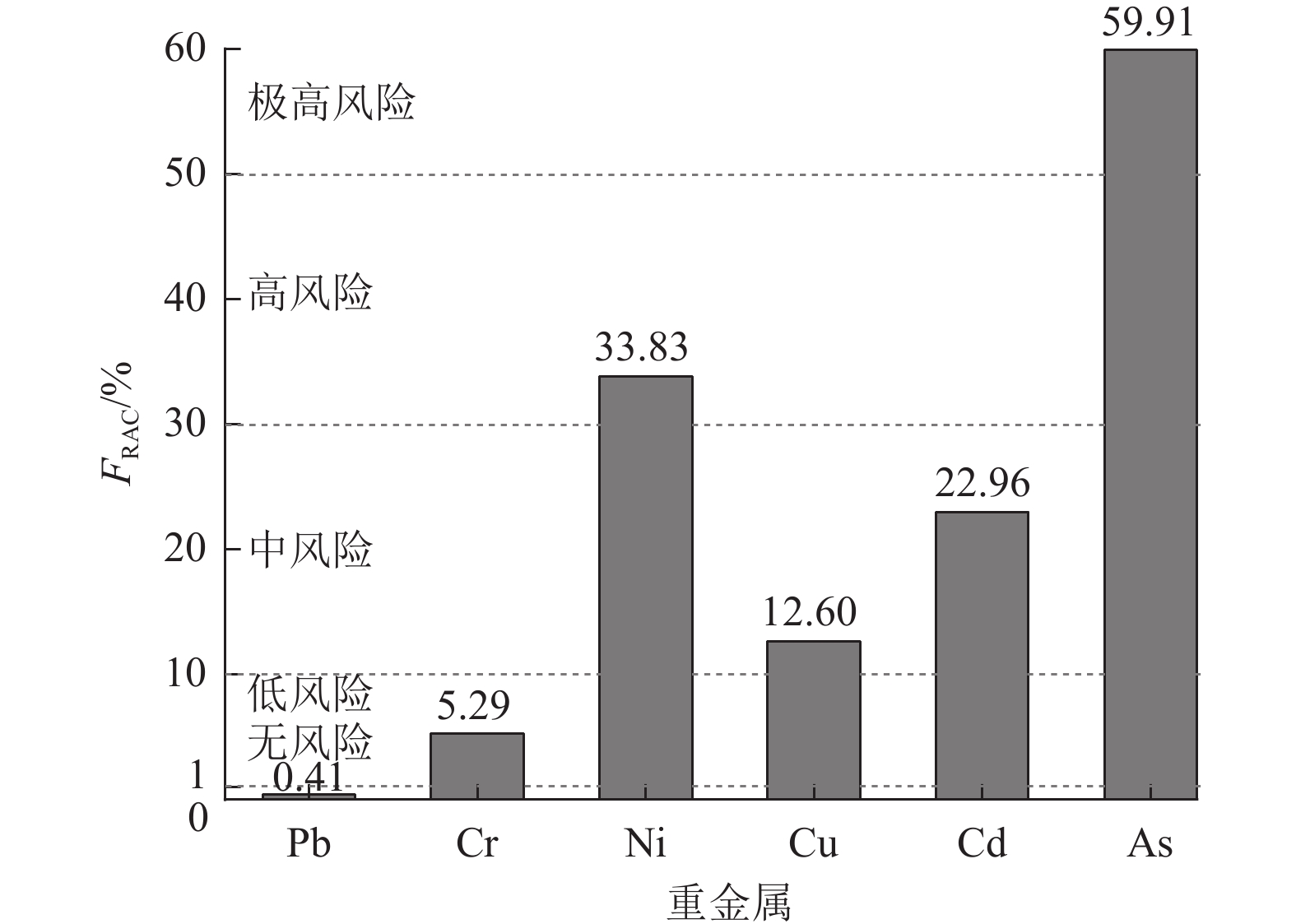Occurrence characteristics and ecological risk assessment of heavy metals in fly ash of Ningdong Energy Chemical Industry Base
-
摘要:
为拓展粉煤灰的资源化利用,以宁夏宁东能源化工基地鸳鸯湖电厂粉煤灰为研究对象,使用扫描电镜、能谱分析和X射线衍射等测试方法对粉煤灰理化特性进行表征和分析,并采用酸消解法、DTPA浸提法和Tessier五步提取法,对粉煤灰中铅(Pb)、铬(Cr)、镍(Ni)、铜(Cu)、镉(Cd)和砷(As)6种重金属的全量、有效态、不同形态含量进行了测定。采用风险评价编码法(RAC)、次生相与原生相比值法(RSP)和潜在生态风险指数法评估粉煤灰重金属生态风险。结果表明:(1) 粉煤灰微观结构良好,密度小,速效钾和速效磷含量丰富。(2) 粉煤灰中6种重金属元素全量和平均值均超过宁夏地区土壤环境背景值,但未超过其他农用地土壤污染风险筛选值(基本项目),超标倍数大小顺序为Pb、Cu、Cr、As、Cd、Ni。6种重金属元素有效态含量均未超过宁夏地区土壤环境背景值和其他农用地土壤污染风险筛选值。(3) RAC评价结果表明,As具有极高生态风险,Cd、Cu和Ni具有中高风险,Cr、Pb分别为低风险和无风险。RSP评价结果表明,重金属As为轻度污染,Pb、Cr、Ni、Cu、Cd均为无污染。潜在生态风险指数法结果表明,粉煤灰中6种元素全量和有效态潜在生态危害指数(RI)处于Ⅰ级,轻微生态危害水平,其中Cd是生态风险的主要贡献元素。因此,粉煤灰可以作为煤矿胶结充填材料进行大规模资源化利用。
Abstract:In order to expand the resource utilization of fly ash, research was conducted based on the fly ash of Yuanyang Lake Power Plant in the Ningdong Energy Chemical Industry Base. Specifically, the physical and chemical properties of fly ash were characterized and analyzed by means of scanning electron microscope, energy spectrum analysis and X-ray diffraction. Besides, the total amount, effective state and content in different forms of Pb, Cr, Ni, Cu, Cd and As in fly ash were determined through acid digestion, DTPA extraction and 5-step Tessier sequential extraction. In addition, the ecological risk of heavy metals in fly ash was assessed with the risk assessment coding method (RAC), the ratio of secondary phase and primary phase (RSP) and the potential ecological risk index. The results show that: (1) The fly ash is in good microstructure at small density, with rich contents of rapidly available potassium and phosphorus. (2) The total average value of the six heavy metal elements in fly ash is higher than the background value of soil environment in Ningxia, but less than the screening value of soil pollution risk of other agricultural land (the basic items). The times of out-of-limit is ranked as Pb, Cu, Cr, As, Cd and Ni in order. The available contents of the six heavy metals do not exceed the background value of soil environment in Ningxia and the screening value of soil pollution risk of other agricultural land. (3) According to the RAC assessment results, the ecological risk is high for As, medium and high for Cd, Cu and Ni, low for Cr and zero for Pb. Meanwhile, the heavy metal As is slightly polluting, while Pb, Cr, Ni, Cu and Cd are non-polluting in accordance with the RSP assessment results. Moreover, the results of potential ecological risk index method show that the total amount and effective RI index of the six elements in fly ash are at grade I, with slight ecological hazard. Especially, Cd is the main contributing element of ecological risk. Therefore, fly ash could be used as the cemented filling material in coal mines for large-scale resource utilization.
-
-
表 1 Tessier提取法
Table 1 Tessier extraction method operation steps
步骤 形态 提取试剂 提取条件 名称 浓度/(mol·L–1) 提取量/mL pH 1 F1 MgCl2 1.0 16 7 25℃振荡1 h 2 F2 NaAC 1.0 16 5 25℃振荡5 h 3 F3 NH4OH·HCl的25%HAC溶液 0.04 40 96℃振荡6 h 4 F4 HNO3 0.02 6 85℃水浴2 h 30%的H2O2 10 85℃水浴3 h 30%的H2O2 6 2 NH4OAC的20%的HNO3溶液 3.2 10 25℃振荡0.5 h 5 F5 HNO3 30 消解液至白色或淡黄色 HF 20 HClO4 10 表 2 Hakanson生态风险分级
Table 2 Hakanson ecological risk classification
生态危害水平 生态风险等级 ${E}_{ {\rm{r} } }^{i}$ RI 轻微 Ⅰ ${E}_{{\rm{r}}}^{i} $<40 RI<150 中等 Ⅱ 40≤${E}_{{\rm{r}}}^{i} $<80 150≤RI<300 强 Ⅲ 80≤${E}_{{\rm{r}}}^{i} $<160 300≤RI<600 很强 Ⅳ 160≤${E}_{{\rm{r}}}^{i} $<320
RI≥600极强 Ⅴ ${E}_{{\rm{r}}}^{i} $≥320 表 3 粉煤灰的元素组成及氧化物含量
Table 3 Composition and Oxide content of fly ash
元素 O Si Al Fe Ca Ti K Mg 质量分数/% 39.25 28.96 23.33 3.04 2.02 1.82 0.96 0.63 原子百分含量/% 54.01 22.70 19.04 1.20 1.11 0.84 0.54 0.57 表 4 粉煤灰中重金属含量与有效态含量统计
Table 4 Concentration of heavy metals in fly ash and effective content statistics
表 5 Hakanson潜在生态风险指数
Table 5 Hakanson potential ecological risk index
重金属元素 参比值${C}_{{\rm{n}}}^{i} $ 单元素含量${C}_{ {\rm{s} } }^{i} $ 单元素潜在生态风险指数${E}_{ {\rm{r} } }^{i} $ 单元素对RI值贡献率/% 综合潜在生态风险指数RI 全量 有效态 全量 有效态 全量 有效态 全量 有效态 Pb 20.60 104.92 0.150 25.47 0.04 21.30 0.41 119.56 8.93 Cr 60.60 132.93 2.231 4.39 0.07 3.67 0.82 Ni 36.60 56.23 0.354 7.68 0.05 6.43 0.54 Cu 22.10 66.46 2.080 15.03 0.47 12.58 5.27 Cd 0.11 0.18 0.018 48.55 4.77 40.60 53.40 As 11.90 21.95 4.205 18.45 3.53 15.43 39.55 -
[1] 李树志,李学良,尹大伟. 碳中和背景下煤炭矿山生态修复的几个基本问题[J]. 煤炭科学技术,2022,50(1):286−292. DOI: 10.3969/j.issn.0253-2336.2022.1.mtkxjs202201029 LI Shuzhi,LI Xueliang,YIN Dawei. Several basic issues of ecological restoration of coal mines under background of Carbon Neutrality[J]. Coal Science and Technology,2022,50(1):286−292. DOI: 10.3969/j.issn.0253-2336.2022.1.mtkxjs202201029
[2] 国家统计局. 中华人民共和国2021年国民经济和社会发展统计公报[R]. 2022. [3] 严博文. 白泥改性粉煤灰微珠的除氟性能及机理研究[D]. 成都: 成都理工大学, 2019. YAN Bowen. Study on mechanisms of fluride removal from aqueous solution using fly ash cenosperes modified with paper mill lime mud[D]. Chengdu: Chengdu University of Technology, 2019.
[4] PANDEY S K,BHATTACHARYA T. Mobility,ecological risk and change in surface morphology during sequential chemical extraction of heavy metals in fly ash:A case study[J]. Environmental Technology & Innovation,2019,13:373−382.
[5] KOSTOVA I,VASSILEVA C,DAI Shifeng,et al. Mineralogy,geochemistry and mercury content characterization of fly ashes from the Maritza 3 and Varna thermoelectric power plants,Bulgaria[J]. Fuel,2016,186:674−684. DOI: 10.1016/j.fuel.2016.09.015
[6] 王小玲. 低热值煤综合利用发电节能技术的应用研究:以永陇矿区低热值煤发电项目为例[J]. 中国煤炭,2019,45(6):82−86. DOI: 10.3969/j.issn.1006-530X.2019.06.017 WANG Xiaoling. Research on comprehensive power generation utilization of energy–saving technology application for low calorific value coal based upon the low calorific value coal power generation project in Yonglong mining area[J]. China Coal,2019,45(6):82−86. DOI: 10.3969/j.issn.1006-530X.2019.06.017
[7] 池朋,吴小文,赵海卿,等. 煤矸石基免烧砖制备工艺及力学性能研究[J]. 矿产保护与利用,2020,40(3):95−99. CHI Peng,WU Xiaowen,ZHAO Haiqing,et al. Preparation and mechanical properties of non–burning bricks with coal gangue as main raw materials[J]. Conservation and Utilization of Mineral Resources,2020,40(3):95−99.
[8] 张斌斌,秦原,谢刚. 煤矸石混凝土的抗渗性能和力学性能分析[J]. 江西建材,2020(6):5−6. DOI: 10.3969/j.issn.1006-2890.2020.06.005 ZHANG Binbin,QIN Yuan,XIE Gang. Analysis of impermeability and mechanical properties of coal gangue concrete[J]. Jiangxi Building Materials,2020(6):5−6. DOI: 10.3969/j.issn.1006-2890.2020.06.005
[9] SINGH M,CHOUDHARY K,SRIVASTAVA A,et al. A study on environmental and economic impacts of using waste marble powder in concrete[J]. Journal of Building Engineering,2017,13:87−95. DOI: 10.1016/j.jobe.2017.07.009
[10] 程有坤,祖发金,史梁. 水泥粉煤灰浆液充填法在采空区公路路基治理中的应用[J]. 建筑技术,2022,53(2):220−223. DOI: 10.3969/j.issn.1000-4726.2022.02.027 CHENG Youkun,ZU Fajin,SHI Liang. Application of cement−flying ash slurry filling method in highway subgrade treatment in goaf[J]. Architecture Technology,2022,53(2):220−223. DOI: 10.3969/j.issn.1000-4726.2022.02.027
[11] 段德丹,廖洪强,候昱灼,等. 粉煤灰、钢渣基腻子粉的性能对比研究[J]. 粉煤灰综合利用,2020,34(4):50−54. DOI: 10.3969/j.issn.1005-8249.2020.04.011 DUAN Dedan,LIAO Hongqiang,HOU Yuzhuo,et al. Comparative study on properties of putty powder prepared from fly ash and steel slag[J]. Fly Ash Comprehensive Utilization,2020,34(4):50−54. DOI: 10.3969/j.issn.1005-8249.2020.04.011
[12] VARADHARAJAN S. Determination of mechanical properties and environmental impact due to inclusion of flyash and marble waste powder in concrete[J]. Structures,2020,25:613−630. DOI: 10.1016/j.istruc.2020.03.040
[13] 杨科,赵新元,何祥,等. 煤基固废充填材料配比试验研究[J]. 山西煤炭,2021,41(4):2−6. YANG Ke,ZHAO Xinyuan,HE Xiang,et al. Experimental study on proportion of coal−based solid waste backfill materials[J]. Shanxi Coal,2021,41(4):2−6.
[14] 韦寒波,巴蕾,高谦. 粉煤灰掺量对胶结充填体强度影响规律研究[J]. 矿业研究与开发,2020,40(12):28−32. DOI: 10.13827/j.cnki.kyyk.2020.12.006 WEI Hanbo,BA Lei,GAO Qian. Study on the influence law of fly ash content on the strength of cemented backfill[J]. Mining Research and Development,2020,40(12):28−32. DOI: 10.13827/j.cnki.kyyk.2020.12.006
[15] 王乐,郭小平,韩祖光,等. 基于废弃物的潞安煤矿废弃地改良土壤基质配比研究[J]. 土壤,2020,52(1):145−152. WANG Le,GUO Xiaoping,HAN Zuguang,et al. Study on formula of soil substrates for improving abandoned lands in Lu’an Coal Mine[J]. Soils,2020,52(1):145−152.
[16] KAUR R,GOYAL D. Mineralogical studies of coal fly ash for soil application in agriculture[J]. Particulate Science and Technology,2015,33(1):76−80. DOI: 10.1080/02726351.2014.938378
[17] HU Xiongfei,HUANG Xunrong,ZHAO Hanghang,et al. Possibility of using modified fly ash and organic fertilizers for remediation of heavy−metal−contaminated soils[J]. Journal of Cleaner Production,2021,284:124713. DOI: 10.1016/j.jclepro.2020.124713
[18] RAJA R,NAYAK A K,SHUKLA A K,et al. Impairment of soil health due to fly ash−fugitive dust deposition from coal−fired thermal power plants[J]. Environmental Monitoring and Assessment,2015,187:679. DOI: 10.1007/s10661-015-4902-y
[19] RAJU N J, PATEL P, GURUNG D, et al. Geochemical assessment of groundwater quality in the Dun valley of central Nepal using chemometric method and geochemical modeling[J]. Groundwater for Sustainable Development, 2015, 1(1/2): 135–145.
[20] OLSON L H,MISENHEIMER J C,NELSON C M,et al. Influences of coal ash leachates and emergent macrophytes on water quality in wetland microcosms[J]. Water Air & Soil Pollution,2017,228:344.
[21] MTARFI N H,RAIS Z,TALEB M,et al. Effect of fly ash and grading agent on the properties of mortar using response surface methodology[J]. Journal of Building Engineering,2017,9:109−116. DOI: 10.1016/j.jobe.2016.12.004
[22] AMEH A E,FATOBA O O,MUSYOKA N M,et al. Influence of aluminium source on the crystal structure and framework coordination of Al and Si in fly ash–based zeolite NaA[J]. Powder Technology,2017,306:17−25. DOI: 10.1016/j.powtec.2016.11.003
[23] LUO Yang,MA Shuhua,ZHAO Zhenqing,et al. Preparation and characterization of whisker−reinforced ceramics from coal fly ash[J]. Ceramics International,2017,43(1):1−11. DOI: 10.1016/j.ceramint.2016.09.211
[24] 刘恒凤,张吉雄,周楠,等. 矸石基胶结充填材料重金属浸出及其固化机制[J]. 中国矿业大学学报,2021,50(3):523−531. LIU Hengfeng,ZHANG Jixiong,ZHOU Nan,et al. Study of the leaching and solidification mechanism of heavy metals from gangue–based cemented paste backfilling materials[J]. Journal of China University of Mining & Technology,2021,50(3):523−531.
[25] 杜芳鹏,雒铮,乔军伟,等. 宁东煤田侏罗纪煤岩煤质特征及清洁高效利用[J]. 煤田地质与勘探,2020,48(2):71−77. DOI: 10.3969/j.issn.1001-1986.2020.02.012 DU Fangpeng,LUO Zheng,QIAO Junwei,et al. Petrographic,quality characteristics and clean & efficient use of Jurassic coal in Ningdong Coalfield[J]. Coal Geology & Exploration,2020,48(2):71−77. DOI: 10.3969/j.issn.1001-1986.2020.02.012
[26] 魏迎春,贾煦,刘志飞,等. 鸳鸯湖矿区延安组煤岩煤质特征及成煤环境研究[J]. 煤炭科学技术,2018,46(7):197−204. DOI: 10.13199/j.cnki.cst.2018.07.031 WEI Yingchun,JIA Xu,LIU Zhifei,et al. Study on lithology and coal quality features and coal forming environment of Yan’an Formation in Yuanyanghu mining area[J]. Coal Science and Technology,2018,46(7):197−204. DOI: 10.13199/j.cnki.cst.2018.07.031
[27] 赵宇星,马凯. 浅析宁夏鸳鸯湖矿区2煤煤质特征及洁净等级划分[J]. 煤炭科技,2020,41(5):121−124. DOI: 10.3969/j.issn.1008-3731.2020.05.037 ZHAO Yuxing,MA Kai. Analysis on coal quality characteristics and cleanliness classification of No.2 coal seam in Yuanyanghu mining area of Ningxia[J]. Coal Science & Technology Magazine,2020,41(5):121−124. DOI: 10.3969/j.issn.1008-3731.2020.05.037
[28] 孙瑞瑞,陈华清,李杜康. 基于土壤中铅化学形态的生态风险评价方法比较[J]. 安全与环境工程,2015,22(5):47−51. SUN Ruirui,CHEN Huaqing,LI Dukang. Comparison of ecological risk assessment methods based on the chemical forms of lead in soil[J]. Safety and Environmental Engineering,2015,22(5):47−51.
[29] 贾赵恒,罗瑶,沈友刚,等. 大冶龙角山矿区农田土壤重金属形态分布及其来源[J]. 农业环境科学学报,2017,36(2):264−271. DOI: 10.11654/jaes.2016-1116 JIA Zhaoheng,LUO Yao,SHEN Yougang,et al. Speciation,distribution and sources of heavy metals in agricultural soils from the mining area of Longjiao Mountain in Daye City[J]. Journal of Agro–Environment Science,2017,36(2):264−271. DOI: 10.11654/jaes.2016-1116
[30] PERIN G, CRABOLEDDA L, LUCCHESE M, et al. Heavy metal speciation in the sediments of northern Adriatic Sea. A new approach for environmental toxicity determination[C]//International Conference: Heavy Metals in the Environment. Edinburgh: CEP Consultants, 1985: 454–456.
[31] HAKANSON L. An ecological risk index for aquatic pollution control:A sedimentological approach[J]. Water Research,1980,14(8):975−1001. DOI: 10.1016/0043-1354(80)90143-8
[32] 钱庆腾,方淑波,乔亚军,等. 盐城海岸带土壤重金属污染风险评价比较研究[J]. 环境污染与防治,2016,38(12):43−48. QIAN Qingteng,FANG Shubo,QIAO Yajun,et al. Comparison of soil heavy metals pollution assessment result of Yancheng coastal zone[J]. Environmental Pollution & Control,2016,38(12):43−48.
[33] 徐争启,倪师军,庹先国,等. 潜在生态危害指数法评价中重金属毒性系数计算[J]. 环境科学与技术,2008,31(2):112−115. DOI: 10.3969/j.issn.1003-6504.2008.02.030 XU Zhengqi,NI Shijun,TUO Xianguo,et al. Calculation of heavy metals’ toxicity coefficient in the evaluation of potential ecological risk index[J]. Environmental Science & Technology,2008,31(2):112−115. DOI: 10.3969/j.issn.1003-6504.2008.02.030
[34] 郑永红,张治国,姚多喜,等. 煤矸石充填复垦对土壤特性影响研究[J]. 安徽理工大学学报(自然科学版),2013,33(4):7−11. ZHENG Yonghong,ZHANG Zhiguo,YAO Duoxi,et al. Study on influence of gangue on reclaimed soil properties[J]. Journal of Anhui University of Science and Technology (Natural Science),2013,33(4):7−11.
[35] 夏子书,白一茹,王幼奇,等. 基于PMF模型的宁南山区小流域土壤重金属空间分布及来源解析[J]. 环境科学,2022,43(1):432−441. DOI: 10.13227/j.hjkx.202105128 XIA Zishu,BAI Yiru,WANG Youqi,et al. Spatial distribution and source analysis of soil heavy metals in a small watershed in the mountainous area of southern Ningxia based on PMF model[J]. Environmental Science,2022,43(1):432−441. DOI: 10.13227/j.hjkx.202105128
[36] 生态环境部, 国家市场监督管理总局. 土壤环境质量农用地土壤污染风险管控标准(试行): GB 15618—2018[S]. 北京: 中国环境出版集团, 2019. [37] 陈国杰. 循环流化床粉煤灰物化特性及重金属浸出影响研究[D]. 太原: 太原理工大学, 2021. CHEN Guojie. Study on physicochemical properties and contributing factors of heavy metals leaching of circulating fluidized bed fly ash[D]. Taiyuan: Taiyuan University of Technology, 2021.
[38] 项玮,韩宝平,朱雪强. 燃煤电厂脱硫粉煤灰理化特性及排放特征[J]. 环境科技,2011,24(6):22−25. DOI: 10.3969/j.issn.1674-4829.2011.06.007 XIANG Wei,HAN Baoping,ZHU Xueqiang. Physicochemical and emission properties of desulfurized fly ash from coal fired power plant[J]. Environmental Science and Technology,2011,24(6):22−25. DOI: 10.3969/j.issn.1674-4829.2011.06.007
[39] 王卫华,雷龙海. 毛坪铅锌矿区农耕地土壤重金属空间分布、污染与生态评估[J]. 排灌机械工程学报,2016,34(11):979−989. WANG Weihua,LEI Longhai. Spatial distribution,contamination and potential ecological risk evaluation of heavy metals in farmlands around Maoping lead–zinc mining area[J]. Journal of Drainage and Irrigation Machinery Engineering,2016,34(11):979−989.
[40] 陈江军,刘波,蔡烈刚,等. 基于多种方法的土壤重金属污染风险评价对比:以江汉平原典型场区为例[J]. 水文地质工程地质,2018,45(6):164−172. CHEN Jiangjun,LIU Bo,CAI Liegang,et al. Comparison of risk assessment based on the various methods of heavy metals in soil:A case study for the typical field areas in the Jianghan Plain[J]. Hydrogeology & Engineering Geology,2018,45(6):164−172.
[41] 陈东东,童士唐. 2种分步浸提方法对土壤种Cr形态提取效果的比较[J]. 环境工程学报,2014,8(9):4022−4026. CHEN Dongdong,TONG Shitang. Comparative assessment of two sequential chemical extraction schemes for fractionation of chromium in polluted soil[J]. Chinese Journal of Environmental Engineering,2014,8(9):4022−4026.
-
期刊类型引用(9)
1. 宁世凯,谢润泽,李斌,任玉鹏,黄俊杰,贺鑫. 砂性土路基换填碾压地基处理抗地震液化效果分析. 路基工程. 2025(01): 206-212 .  百度学术
百度学术
2. 谭静,侯涛,杜小渊,戈璞,李继伟. 基于支持向量机与因子分析的电容器状态识别研究. 铁道车辆. 2024(04): 86-91 .  百度学术
百度学术
3. 吕俊超,俞社鑫,周渊. 基于循环神经网络的砂土液化预测模型. 四川建材. 2022(04): 96-98 .  百度学术
百度学术
4. 叶童,李治广. 基于ELM原理的砂土液化判别模型及应用. 山西建筑. 2022(16): 7-10+73 .  百度学术
百度学术
5. 邢明源,胡欣宇. 基于神经网络模型的砾性土液化预测. 华北科技学院学报. 2021(03): 75-80 .  百度学术
百度学术
6. 亚生江·阿布德热合曼. 水闸砂土地基地震荷载作用下液化特征研究. 水利技术监督. 2020(03): 265-268 .  百度学术
百度学术
7. 陈宇奇,施国良,张潇潇,谢泽宇. 基于修正RFM模型的高校图书馆热门图书评价体系及影响因素研究. 图书馆学研究. 2020(10): 58-68 .  百度学术
百度学术
8. 葛迪,陈文韬,侯群. 高速传送带上的工业元件瑕疵检测分类系统. 电子测量技术. 2020(10): 42-47 .  百度学术
百度学术
9. 朱光婷,潘晓琳. 基于因子分析和SVM的网络舆情危机预警研究. 重庆工商大学学报(自然科学版). 2020(05): 94-100 .  百度学术
百度学术
其他类型引用(6)







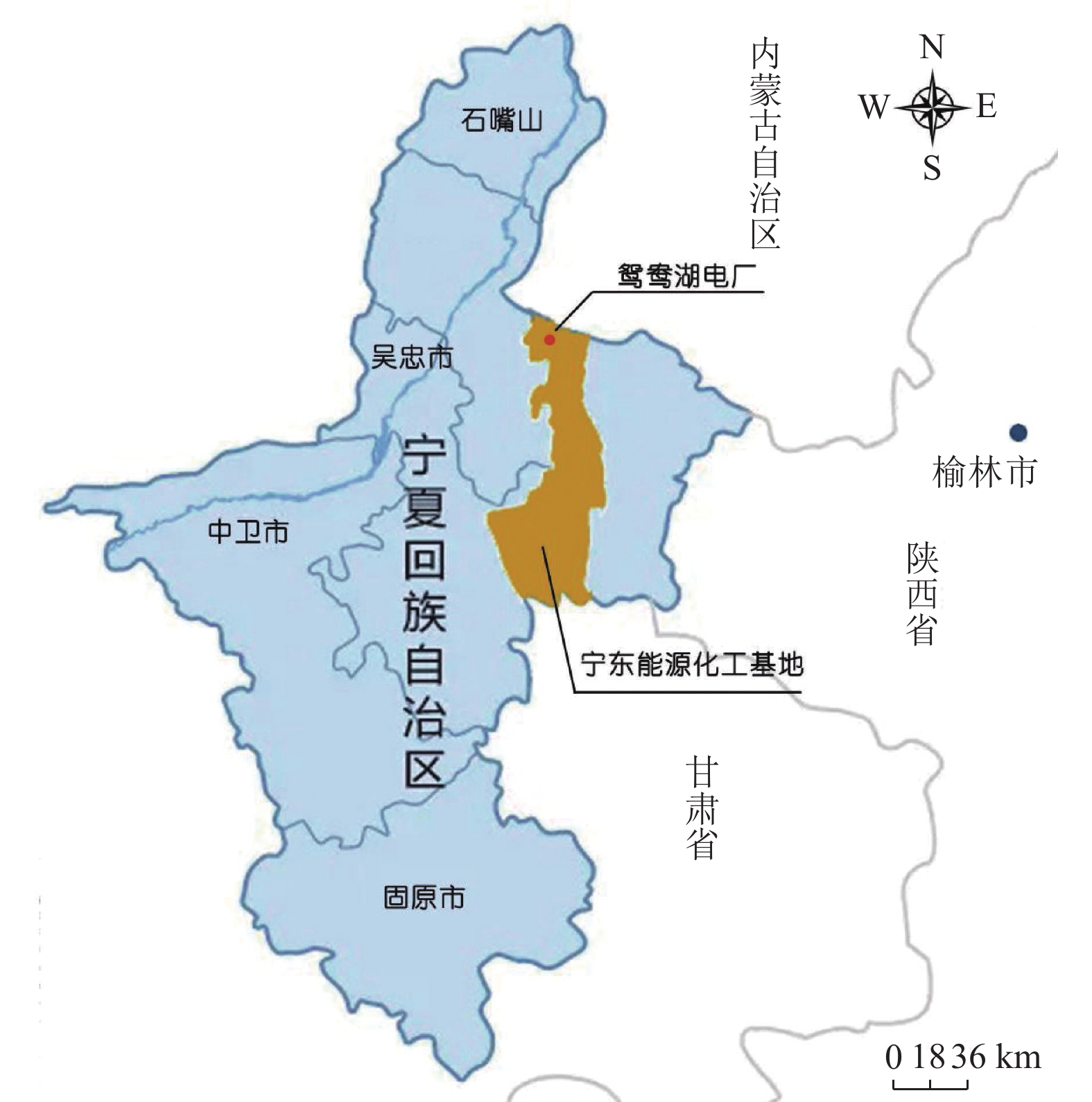
 下载:
下载:
